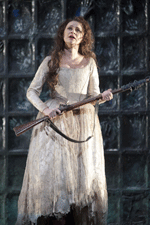> [Archived] Interviews

Ruxandra Donose about Donna Elvira: 'I believe that all her actions come from an endless love, a generous and altruistic love.'
How do you see the character of Donna Elvira now?
I try to treat it with much responsibility and sincerity and even though Elvira finds herself in certain ridiculous situations, I still think that there is nothing humorous about the life and experiences of this character. In order to believe in her, to give her all my devotion and at the same time identify myself as much as possible with the character of Donna Elvira, I have convinced myself that all her actions come from an endless love, a generous and altruistic love. I retrace her journey from the first aria, when she comes looking for Don Giovanni and hopes for a happy end, until her last performance, when she makes a final attempt to restate her love rather than live a happy end.
How has the production been received so far?
The reception has been very, very favourable. The audience is extremely enthusiastic, they enjoy to the fullest the well-known musical moments - the performance is very often interrupted because of the applauses, and at the same time they laugh at the comical situations that arise. In the end they reward us with roars of applauses and ovations.
Constantinos Carydis is conducting the orchestra. How is it to work with him and how would you describe him in a few words?
Working with Constantinos Carydis has been very fruitful. He is not like other conductors; the way in which he approaches this widely known music surprises you every time. He approaches the tempos differently. He takes you by surprise and puts you in a position in which you have to somehow fight certain ideas that have already formed in your mind, arias that you have been expecting for so long and all of a sudden turn into slow paced arias, duets, ensembles and so on - they all put your flexibility to the test, so to speak. I think that it is very interesting what he is doing, it looks well thought out. From my point of view, he manages to justify these tempo changes by dramatically explaining the purpose of the characters and what is going on and it seems to me that he is very careful and pays great attention to the performers. All in all, working with Constantinos Carydis has been a very positive experience.
The last performance of the opera will be on 19 February. On what stages will you be performing next?
I will take a short break and then I will head to Strasbourg, where the opera Farnace by Vivaldi will be staged. I have recorded it just recently with the EMI Virgin Classics and I performed it on the concert platform in Paris and Lausanne, but now I will perform it on stage.
Translated by Raluca Mizdrea and Stela Cucu
MTTLC, Bucharest University














